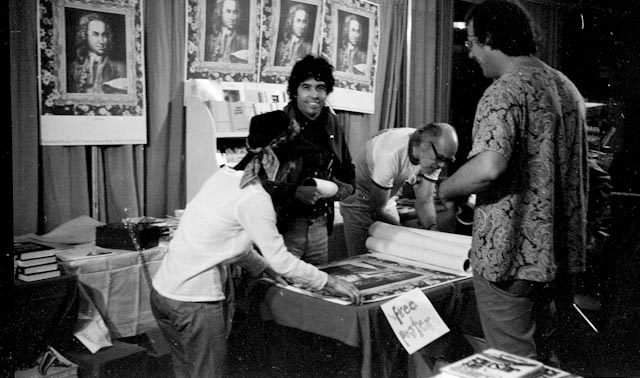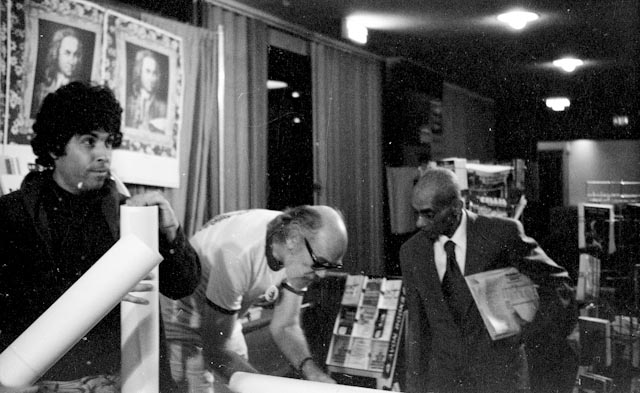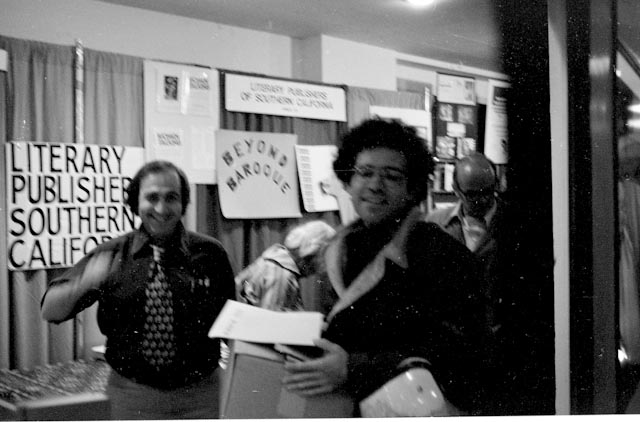Sunday, March 11, 2018
Although I am working on new poems and thinking about which of my past academic talks I should begin revising in hopes of publication, the challenge of setting aside time to make those endeavors my sole concern remains as complicated as ever. A year and a half ago, one of the members of Beyond Baroque’s Board of Trustees asked me to join the Board, a move that I can hardly afford to undertake on a financial level, let alone how much time that requires. Even during times when the GDP of the United States indicates the system’s general economic stability, non-profit arts organizations must negotiate and bargain with a culture that did not particularly want them to last more than a decade or two. To attain the half-century mark is no small achievement, but Beyond Baroque is hardly assured of a sufficient budget for its future programming.
This weekend has been one of the highlights of the spring season. Funded completely out of his own pocket, S.A. Griffin has organized a celebration of the Beat movement, which concludes tomorrow evening with a musical performance by David Amram. Yesterday afternoon, I gave a talk on Venice West, and then moderated a panel at which two of the original members of that community recalled their experiences in considerable detail. Frank T. Rios Joseph Patton, and Gayle Davis talked with each other in an honest manner about the glorious sense of freedom that Venice West exuded along with the eventual confinements of drug addiction. Paton acknowledged that Rios has pulled him out of addiction. Rios, in turn, credited the Poem with saving his life.
Fortunately, UCLA had sent out a camera and a one-man crew to record this conversation, so future scholars of Venice West will understand how much visual art mattered to this scene. It was a pleasure to hear the work of Don Martin and Saul White cited so frequently. I am not certain when the tape will be available for viewing, but I hope that someday it can be posted on-line so that scholars and students have easy access to it.
Oddly enough, Venice West often gets summed up by a quick reference to a handful of poets, and yet the conversation yesterday barely got around to discussing John Thomas, and William Margolis was not mentioned at all. Margolis, who was a close friend of Bob Kaufman’s when he lived in San Francisco, is hardly neglected this weekend, though. He is the subject of a documentary film by Don Rothenberg that will be shown today from 3:30 to 4:00 p.m. There will also be a discussion of the Beat and Buddhism with Marc Olmsted, who was also read with Steve Silberman and Tate Swindell in a segment on Gay Beat writing (4:30 – 6 p.m.).
Considering how skittish L.A. residents can be about a rain storm finally showing up after months of a renewed drought, the audiences have been surprisingly large enough to make this festival of the Beat a satisfying occasion and more than worth S.A. Griffin’s extended efforts in putting it all together. Paul Vangelisti, for instance, was supposed to be part of the panel on Venice West, but a dead battery kept him tethered at home. He told me, however, that 30 people had shown up for his reading with Neeli Cherkovski.
About three dozen poets will have read their poetry or talked about the Beat and the Neo-beat by the time David Amram gives a musical performance tomorrow night (Monday, at 9:30 p.m. I truly wish that I had enough time to have been at all the events of this festival. I regret especially not being able to attend the opening ceremonies featuring Frank T. Rios and George Herms, as well as the “Women of the Beat Generation Reading.” I would have loved to have heard Yama Lake, Larry Lake’s son, read, too, as well Marc Olmsted. In addition, Michael C. Ford and Will Alexander were giving talks.
One of the highlights of this festival, however, was probably the “Punk & Beat reading” by Linda J. ALbertano, Iris Berry, Jack Brewer, Michael Lane Bruner, S.A. Griffin, Doug Knott, and A. Razor. All I can say is that I want an extended encore presentation at a time that allows me to absorb the full ramifications of these lifetimes of contumacious poetics.
It was perhaps appropriate that I began the day by meeting with Pedro Paulo Araujo, who is working on a short animated film based on the final two stanzas of Leland Hickman’s poem, “The Hidden.” That poem was one of ten “Elements” that was published in Hickman’s Great Slave Lake Suite in 1980. I met with Pedro at 10:00 a.m. at Portfolio Coffeehouse in Long Beach to discuss Hickman’s poetry in general and that poem in particular. I gave him a copy of “Lee Sr. Falls to the Floor,” which Lee had written in the mid-1960s, as a means of providing some background for Lee’s life-long wrestling with the sudden death of his father. Pedro became interested in Lee’s poetry because his film company is working on digitizing the audio tapes of readings at Beyond Baroque. One recent tape he worked on was a reading Lee gave with Barrett Watten in 1984, on one of the coldest nights that anyone in Venice could recall. The audience was very small – maybe about eight people – and almost all of us at one point or another had to get up and walk around the read area of the folding chairs in order to warm up. We were bundled up in sweaters and jackets, but it wasn’t enough. Still, it was one of the best readings I ever attended.
Before heading off to my meeting with Pedro, I took a quick look at the first set of galleys for my forthcoming book from What Books. The typeface seems on the comfortable and familiar side, and perhaps that will work out for the best. The poems, which appear in both English and Spanish, are varied enough in their shapeliness that a more unusual typeface might prove distracting. I’ve waited a long time for this book and can’t wait to send my closest friends a copy.
Finally, I want to mention how much I appreciated seeing Carolyn Rios at yesterday’s event at Beyond Baroque. I worked with Carolyn’s students at Venice Continuation High School for several years (1989-1996). Most of the time I was an artist-in-residence funded by the Cultural Affairs Department of the City of Los Angeles. The CPITS (California Poets in the Schools) program had largely lost its impetus, at least in Southern California, by the mid-1980s, and I had turn to other sources for support in order to teach poetry to young people. Although I worked at other continuation high schools, too, Venice Continuation High holds a special place in my heart. I guess I have indeed aged, though. Carolyn at first did not recognize me, even though we were in Beyond Baroque’s lobby for several minutes before we happened to start talking to each other. On the other hand, until she took off her beret, I did not recognize her, either. Once memory had adjusted to present perception, though, we both felt as young as ever.



 About Bill Mohr
About Bill Mohr